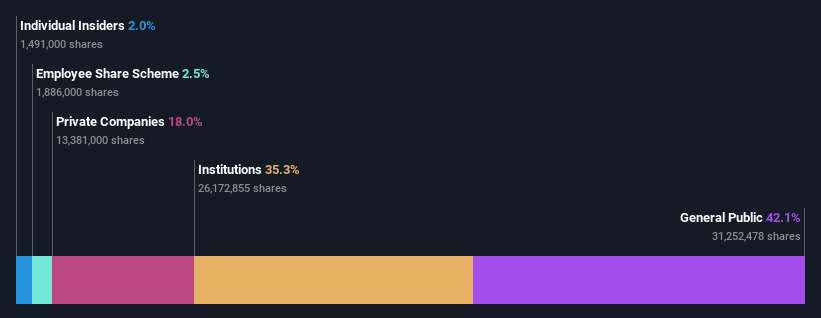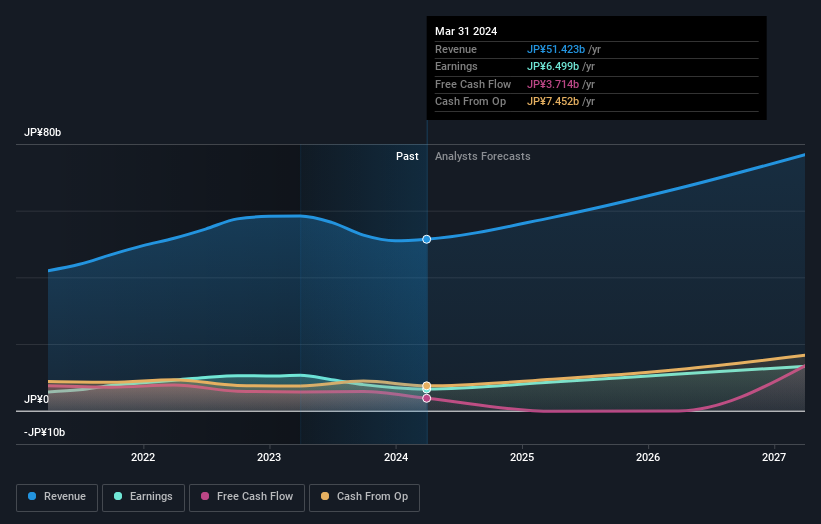retail investors who own 42% along with institutions invested in Fujimi Incorporated (TSE:5384) saw increase in their holdings value last week

Key Insights
- The considerable ownership by retail investors in Fujimi indicates that they collectively have a greater say in management and business strategy
- The top 13 shareholders own 50% of the company
- 35% of Fujimi is held by Institutions
A look at the shareholders of Fujimi Incorporated (TSE:5384) can tell us which group is most powerful. The group holding the most number of shares in the company, around 42% to be precise, is retail investors. Put another way, the group faces the maximum upside potential (or downside risk).
Retail investors gained the most after market cap touched JP¥237b last week, while institutions who own 35% also benefitted.
Let's delve deeper into each type of owner of Fujimi, beginning with the chart below.
See our latest analysis for Fujimi

What Does The Institutional Ownership Tell Us About Fujimi?
Many institutions measure their performance against an index that approximates the local market. So they usually pay more attention to companies that are included in major indices.
As you can see, institutional investors have a fair amount of stake in Fujimi. This suggests some credibility amongst professional investors. But we can't rely on that fact alone since institutions make bad investments sometimes, just like everyone does. If multiple institutions change their view on a stock at the same time, you could see the share price drop fast. It's therefore worth looking at Fujimi's earnings history below. Of course, the future is what really matters.

We note that hedge funds don't have a meaningful investment in Fujimi. Koma Co. Ltd. is currently the company's largest shareholder with 18% of shares outstanding. Capital Research and Management Company is the second largest shareholder owning 6.8% of common stock, and MUFG Bank, Ltd.,Investment Banking Arm holds about 2.9% of the company stock. Additionally, the company's CEO Keishi Seki directly holds 1.8% of the total shares outstanding.
A closer look at our ownership figures suggests that the top 13 shareholders have a combined ownership of 50% implying that no single shareholder has a majority.
Researching institutional ownership is a good way to gauge and filter a stock's expected performance. The same can be achieved by studying analyst sentiments. There are plenty of analysts covering the stock, so it might be worth seeing what they are forecasting, too.
Insider Ownership Of Fujimi
The definition of an insider can differ slightly between different countries, but members of the board of directors always count. Management ultimately answers to the board. However, it is not uncommon for managers to be executive board members, especially if they are a founder or the CEO.
Insider ownership is positive when it signals leadership are thinking like the true owners of the company. However, high insider ownership can also give immense power to a small group within the company. This can be negative in some circumstances.
We can see that insiders own shares in Fujimi Incorporated. The insiders have a meaningful stake worth JP¥4.8b. Most would see this as a real positive. If you would like to explore the question of insider alignment, you can click here to see if insiders have been buying or selling.
General Public Ownership
The general public-- including retail investors -- own 42% stake in the company, and hence can't easily be ignored. While this group can't necessarily call the shots, it can certainly have a real influence on how the company is run.
Private Company Ownership
Our data indicates that Private Companies hold 18%, of the company's shares. It's hard to draw any conclusions from this fact alone, so its worth looking into who owns those private companies. Sometimes insiders or other related parties have an interest in shares in a public company through a separate private company.
Next Steps:
While it is well worth considering the different groups that own a company, there are other factors that are even more important. Take risks for example - Fujimi has 3 warning signs (and 1 which shouldn't be ignored) we think you should know about.
Ultimately the future is most important. You can access this free report on analyst forecasts for the company.
NB: Figures in this article are calculated using data from the last twelve months, which refer to the 12-month period ending on the last date of the month the financial statement is dated. This may not be consistent with full year annual report figures.
New: AI Stock Screener & Alerts
Our new AI Stock Screener scans the market every day to uncover opportunities.
• Dividend Powerhouses (3%+ Yield)
• Undervalued Small Caps with Insider Buying
• High growth Tech and AI Companies
Or build your own from over 50 metrics.
Have feedback on this article? Concerned about the content? Get in touch with us directly. Alternatively, email editorial-team (at) simplywallst.com.
This article by Simply Wall St is general in nature. We provide commentary based on historical data and analyst forecasts only using an unbiased methodology and our articles are not intended to be financial advice. It does not constitute a recommendation to buy or sell any stock, and does not take account of your objectives, or your financial situation. We aim to bring you long-term focused analysis driven by fundamental data. Note that our analysis may not factor in the latest price-sensitive company announcements or qualitative material. Simply Wall St has no position in any stocks mentioned.
About TSE:5384
Fujimi
Manufactures and sells synthetic precision abrasives in Japan and internationally.
Flawless balance sheet and fair value.


